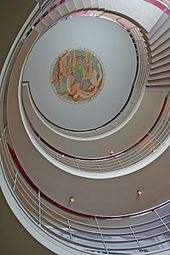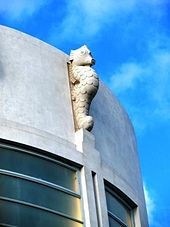- Midland Hotel, Morecambe
-
Coordinates: 54°04′20″N 2°52′31″W / 54.0721°N 2.8754°W
The Midland Hotel is a famous Streamline Moderne building in Morecambe, in Lancashire, England. It was built by the London, Midland and Scottish Railway (LMS), in 1933, to the designs of architect Oliver Hill, with sculpture by Eric Gill.[1][2] It is a Grade II* listed building. The hotel has been completely restored by Urban Splash with architects Union North, Northwest Regional Development Agency and Lancaster City Council.
Contents
Construction
The Midland Hotel was built to replace two earlier hotels: the North Western Hotel in Morecambe that was built in 1848 by the "little" North Western Railway and had been renamed the Midland Hotel in 1871 when the Midland Railway took over the North Western Railway; and a supplementary hotel at Heysham, called the Heysham Towers, which was converted from a private house in 1896.[1][2] The Heysham Towers was intended to serve railway steamer traffic from Heysham Harbour to Belfast; but it was not a success and was sold in 1919.[1]
In 1932, the London, Midland and Scottish Railway (LMS) bought land from Morecambe Corporation to build the new 40-bedroom Midland Hotel to replace the old Midland Hotel. It opened in July 1933.[1]
The design
The building owes a lot to the Streamline Moderne branch of Art Deco. Oliver Hill designed a three storey curving building, with features such as a central circular tower containing the entrance and a spiral staircase, and a circular cafe at the north end. The front of the hotel also boasts two Art Deco seahorses, which can be viewed at close detail by access to the restored hotel's new rooftop terrace.
The hotel stands on the seafront with the convex side facing the sea, while the concave side faces the railway station - in homage to the railway company whose showcase hotel this was. Hill designed the hotel to complement the curve of the promenade, which also allowed guests to view spectacular panoramas of the north west coast.
War time use and disposal
The Midland Hotel and Morecambe itself began to lose popularity and in September 1939 the hotel was requisitioned by the Royal Navy.[1] The navy used it until September 1947; paying £1,900 rent per year.
Upon Nationalisation of the railways, ownership transferred on 1 January 1948 to the British Transport Commission (BTC), coming under the control of the BTC's Railway Executive; however on the 1 July 1948, along with the other railway hotels, ownership was transferred to the BTC's Hotels Executive.[3] It was sold by the Hotels Executive in 1952.[1]
A new lease of life
Union North acted as architects to Urban Splash for the refurbishment and expansion of the Midland hotel commencing in 2006. It opened its doors to the public in the summer of 2008.
In April 2009 Urban Splash announced a new partnership that would see English Lakes Hotels manage the Midland Hotel in Morecambe from 8 April 2009.[4] Further developments on the nearby Central Promenade are planned by Urban Splash.[5]
Other history
It was used in filming episodes of the TV series Poirot, starring David Suchet, in 1989, most notably in the episode 'Double Sin'. During this episode the actual name of the hotel is referred to by one of the main characters of the detective series - Captain Hastings.[6]
See also
- Eric Gill at the Midland Hotel, Morecambe
- British Transport Hotels
References
- ^ a b c d e f Carter, Oliver (1990). An illustrated history of British Railway Hotels: 1838-1983. St Michael's: Silver Link Publishing. ISBN 0-947971-36-X
- ^ a b Simmons, Jack and Biddle, Gordon (1997). The Oxford Companion to British Railway History: From 1603 to the 1990s. Oxford: Oxford University Press. ISBN 0-19-211697-5.
- ^ Skelsey, Geoffrey (2006). "Famous Hotel-Keepers for over a century: British Railway Hotels under State Ownership, 1948-84". In: Back Track, Volume 20, No. 7 (July 2006). Pp 390 - 399. ISSN 0955-538071.
- ^ English Lakes Hotels News Archive
- ^ "Splash 'committed' to finishing Morecambe scheme". Place North West. 19 August 2010. http://www.placenorthwest.co.uk/news/archive/6938-splash-committed-to-finishing-morecambe-scheme.html. Retrieved 6 September 2010.
- ^ Article in The Visitor
External links
- The Midland Hotel Website
- Friends of the Midland Hotel site
- Information on the original Architect - Oliver Hill
- The Midland Hotel at Morecambe, October 2001, The Twentieth Century Society
Categories:- 1933 architecture
- Art Deco buildings in England
- Buildings and structures in Lancaster
- Grade II* listed buildings in Lancashire
- Hotels established in 1933
- Hotels in Lancashire
- Railway hotels in England
- Streamline Moderne architecture in the United Kingdom
Wikimedia Foundation. 2010.



